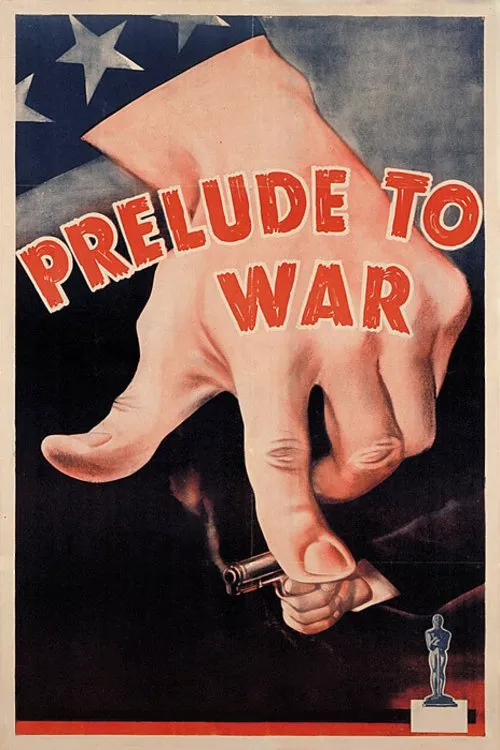Why We Fight: Prelude to War

Enredo
Prelude to War, the first installment of Frank Capra's influential Why We Fight film series, sets the stage for a powerful indictment of the Fascist powers and their assault on democracy. Released in 1942, this cinematic essay was designed to enlighten and persuade American troops, commissioned by General George C. Marshall and funded by the United States Army to counter the prevailing isolationism in the United States during World War II. Capra's magnum opus is a clarion call to arms, presenting the stark realities of the conflict and the importance of unity and cooperation against the Fascist axis. The film commences with a poignant introduction, establishing the core themes of the series: to educate the audience on the origins and implications of the global conflict and persuade them to join the Allied forces in their struggle for freedom. Through striking imagery, Capra juxtaposes democratic societies and their institutions with the brutal reality of Fascist regimes. This dichotomy serves as a powerful foundation for the narrative that unfolds, as the director masterfully weaves historical and contemporary elements to illustrate the stark contrasts between the two ideologies. The opening scenes transport viewers to ancient civilizations, where the seeds of democracy were sown. Capra's cinematic journey traverses epochs, showcasing key milestones in the development of democratic governance, such as the Athenian system of direct democracy and the Roman Republic's representative framework. These historical vignettes underscore the fundamental principles of democracy: the value of individual freedom, the importance of civic participation, and the concept of popular sovereignty. These tenets, Capra suggests, provide the bedrock upon which modern democratic societies have been built, from the fledgling United States to the United Kingdom. The narrative, however, rapidly shifts its focus to the rise of Fascist powers, highlighting the stark contrasts between these totalitarian regimes and democratic systems. Capra's analysis reveals how Fascist ideologies, exemplified by the likes of Adolf Hitler and Benito Mussolini, seek to erase the lines between government and society, subjugating individual freedoms, and silencing dissenting voices. Through haunting images of Fascist rallies, parades, and state-sponsored brutality, the film illustrates the repressive essence of these regimes, where citizens live in constant fear of persecution and state control. One of Prelude to War's most significant contributions lies in its nuanced portrayal of the complexities surrounding the causes of World War II. Capra skillfully dissects the complex web of events leading to the conflict, situating America's entry into the war within a broader historical context. He scrutinizes the Treaty of Versailles, Germany's post-war resentment, and the appeasement policies of Britain and France, laying bare the sequence of diplomatic failures that created a climate of aggression in Europe. This multifaceted approach avoids simplistic villainization, opting instead for a more comprehensive understanding of the intricate dynamics at play. Throughout the film, Capra's masterful editing, striking visuals, and evocative narration combine to deliver a persuasive argument in favor of collective action against the Axis powers. His cinematic essay presents a series of compelling contrasts, highlighting the stark differences between democratic and Fascist societies. By juxtaposing the ideals of democracy with the harsh realities of Fascist rule, Capra's Prelude to War galvanizes the audience, imbuing them with a deep sense of urgency and a commitment to the values they hold dear. The climax of the film arrives with a stark and unflinching portrayal of Germany under Nazi rule. Capra reveals the gruesome consequences of totalitarianism, exposing the atrocities committed by the Nazi regime: their treatment of Jews, their forced labor policies, and their military aggression. These graphic illustrations not only condemn the Nazi atrocities but also underscore the importance of Allied unity in resisting the spread of Fascist ideology. In its conclusion, Prelude to War offers a fervent plea for American troops to join the Allied forces in their battle for freedom and democracy. Acknowledging the initial reluctance of the American public to enter the war, Capra appeals to the soldiers' sense of duty, emphasizing that the battle ahead is not merely a military one but also a spiritual one – a fight for the preservation of democratic values and the protection of individual freedoms. Capra's words serve as a powerful call to action, urging the viewer to become a champion of democracy and join the collective effort to vanquish the forces of oppression. In 1942, with America at war, Prelude to War played a pivotal role in rallying public support and mobilizing troops for the global conflict. Today, as a cinematic legacy, Frank Capra's influential film remains an urgent reminder of the consequences of totalitarianism and the unwavering importance of democratic values in the face of tyranny. By chronicling the stark contrasts between democracy and Fascism, Capra's Why We Fight series serves as a searing indictment of oppression and a testament to the enduring power of collective action and democratic principles.
Resenhas



